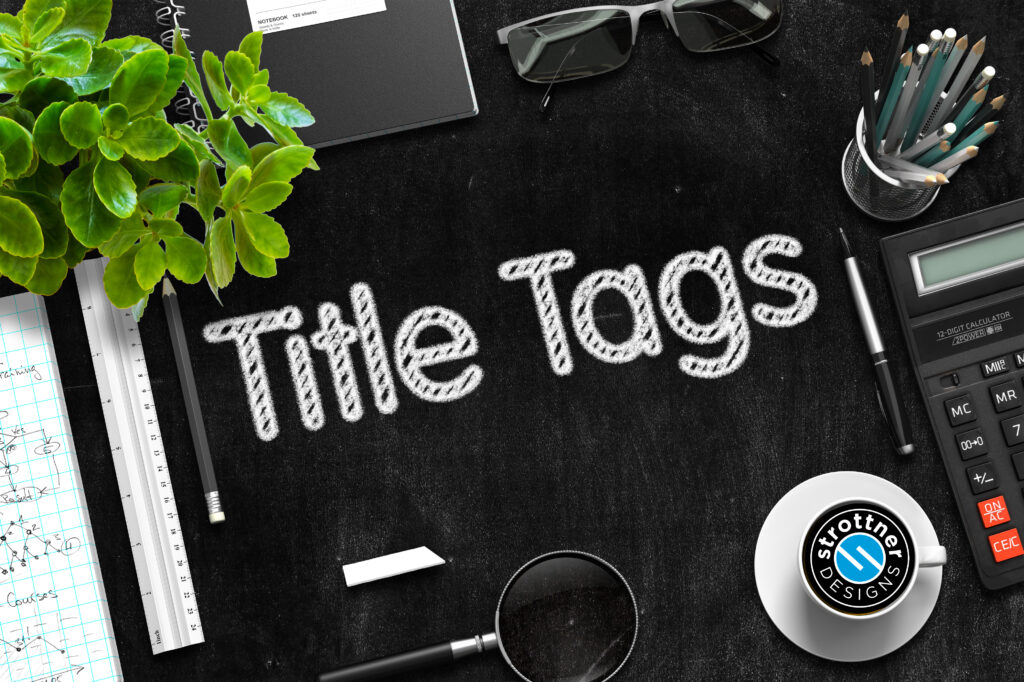What do Title Tags have to do with SEO?
Over the course of the last year, we’ve written a lot about SEO, or search engine optimization. It’s been time well spent, and an important primer on the topic. However, while performing our monthly reporting this month, we realized that there are so many terms in our reports, that it can be overwhelming. We were also inspired by a recent blog post that we wrote for a client (shameless self-promotion on this coming soon) on a somewhat basic topic. Based upon all of this information, we decided to strip SEO down to it’s most basic parts, more basic even than “on-page,” “off-page,” and “technical SEO.” Yes, we are going to explain the factors that make up these large search engine optimization categories, and why they are important. In this blog post, we’re going to begin with a detailed explanation of the importance of title tags.
What Are Title Tags?
Title tags are a crucial part of on-page SEO and they play a significant role in helping search engines understand the content of your web pages. There are two important things that you need to know:
- Definition – A title tag is an HTML element that specifies the title of a web page. If you were to go to Espn.com, right-click on the site, and then click “View Page Source,” you’d see a ton of code, and within this code is the title tag. We’ve identified it for you, it’s inside of the yellow box:
 Note that the title tag isn’t necessarily the same as the H1 title on your page. It needs to be shorter and more specific, but without it Google might be confused, and you don’t want Google confused, do you? (No, you don’t)
Note that the title tag isn’t necessarily the same as the H1 title on your page. It needs to be shorter and more specific, but without it Google might be confused, and you don’t want Google confused, do you? (No, you don’t) - Visibility – The title tag appears in several places:
- Search Engine Results Pages (SERPs): It’s the clickable link that users see when your page shows up in search results.
- Browser Tabs: When users have your page open, the title tag appears in their browser tab.
- Anchor Text: Other websites often use the title tag as anchor text when linking to your page.
- Social Media Links: It’s also displayed when your page is shared on social media platforms.
Why Are Title Tags Important for SEO?
- Search Engine Ranking Factor
- Google considers title tags as a ranking factor, albeit a relatively small one. In other words, well-crafted title tags contribute to your page’s overall SEO performance.
- While they won’t single-handedly propel your page to the top of search results, they do play a role in the grand SEO orchestra.
- As part of our monthly reporting, we look at the content and length of all Concierge-SEO client title tags.
- Click-Through Rate (CTR)
- An enticing title tag can significantly impact your CTR. When users see a compelling title, they’re more likely to click through to your page.
- Think of it as the first impression your page makes on potential visitors. A dull or uninteresting title won’t encourage clicks, but a well-crafted one will.
- In our analytics, we review Impressions and Click-Through data, when there is a significant disparity between the these measurements, we review and re-write.
- Content Relevance:
- Your title tag communicates the topic of your page to both users and search algorithms. When search engines understand what your page is about, they’ll display it in relevant search results.
- Appearing in more relevant search results means more organic traffic to your page.
- Brand Awareness and Conversions:
- Accurate title tags help you connect with relevant audiences. When searchers understand what your page offers, they’re more likely to engage with your content.
- Increased brand awareness and better-targeted traffic can lead to more conversions.
- Accessibility:
- For users with vision impairments who rely on screen readers, the title tag is the first thing read aloud.
- Ensuring accessibility is not only good practice, but also a Google ranking factor.
- At Strottner Designs, we make sure that all Concierge Clients have ADA compliant websites, and discuss this with prospective website design clients as well.
Final Thoughts
Crafting thoughtful title tags is essential for small business websites. They bridge the gap between search intent, user engagement, and SEO success. So, next time you create a web page, give your title tag the attention it deserves! If you aren’t sure how your title tag performs, you can always use the free audit tool on our homepage to find out. And if you’d like to learn more, contact us through the contact form to the right, or through support@strottner.com.










